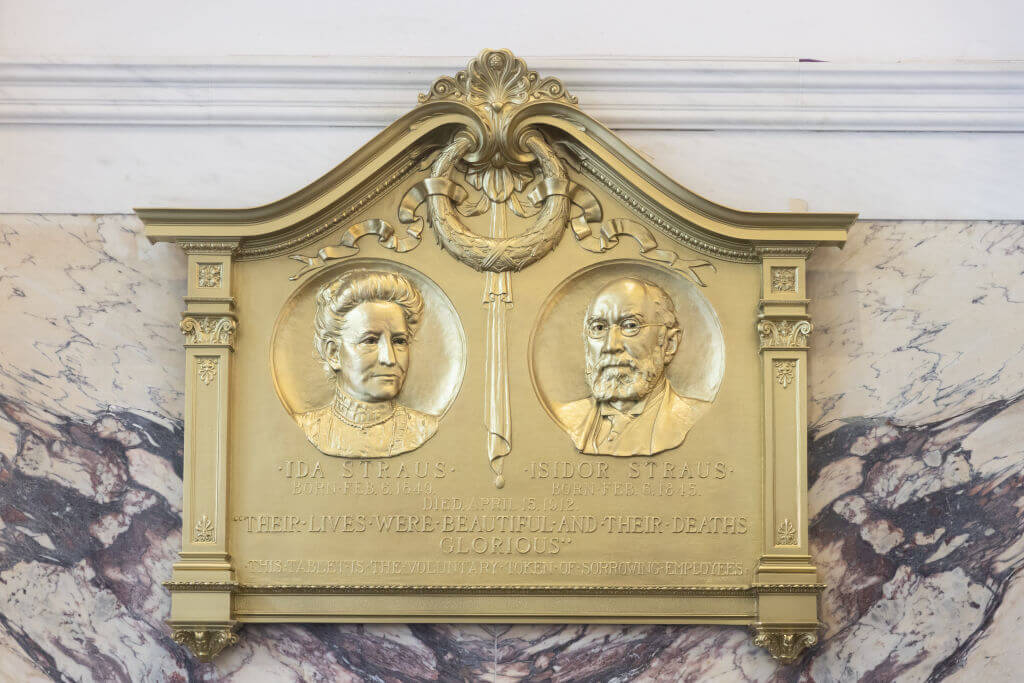Wife of submersible operator is a descendant of Titanic’s famed Jewish victims
Wendy Rush’s great-great-grandfather was Macy’s president Isidor Straus

A plaque of former co-owner Isidor Straus and his wife Ida Straus at the Macy’s flagship store in New York, in 2022. Photo by Jeenah Moon/Bloomberg via Getty Images
The wife of one of the people aboard the submersible that went missing on an expedition to view the Titanic is a descendant of the most famous Jewish passengers from that ship’s doomed voyage.
Wendy Rush, whose husband Stockton Rush is the CEO of OceanGate, the company that ran submersible trips to the Titanic wreck on the ocean floor, is the great-great-granddaughter of Isidor and Ida Straus. Rush and four other people on the submersible were presumed dead when pieces of the vessel were found near the Titanic.
According to the Straus Historical Society, a nonprofit dedicated to preserving Straus family history, Isidor was the son of Lazarus Straus, a German immigrant who, in 1854, opened a dry goods store in rural Georgia. After the Civil War, the family moved to New York City and began importing goods like china and glassware. In 1873, Isidor’s brother Nathan convinced Rowland H. Macy to allow his family to open a concession in the basement of his store. By 1896, the Straus family were the sole owners of Macy’s.
Isidor Straus also dabbled in politics, serving as a congressman for New York from January 1894 to March 1895.
Listen to That Jewish News Show, a smart and thoughtful look at the week in Jewish news from the journalists at the Forward, now available on Apple and Spotify:
But Isidor was best known as president of Macy’s when he and Ida boarded the Titanic in England on April 10, 1912, after a trip to visit Germany, where he was born. Four days later, the ship hit an iceberg in the North Atlantic and sank. More than 1,500 of the 2,240 passengers lost their lives in the icy waters.
The Straus’ fates were dramatized in the 1997 blockbuster movie Titanic: Although not major characters, the couple were shown hugging in their stateroom as it filled with water. But their actual last moments were somewhat different: The couple’s maid, Ellen Bird, had joined them on their trip. As the ship sank, Ida insisted Bird board a lifeboat and even gave Bird her fur coat. Ida stayed with her husband, reportedly saying that she would not leave him after so many years together.
The Straus’ story was immediately picked up by the Forward, as the newspaper reported on April 16 that “apparently Mrs. Straus did not want to part from her husband and did not use the opportunity to save herself.”
According to the United Kingdom’s National Archives, they were last seen “on deck holding hands before a wave swept them both into the sea.”
Isidor’s body was recovered and he was buried in New York City’s Woodlawn Cemetery; his wife’s body was never found. The couple’s fate was immortalized in Yiddish songs, including Solomon Smulewitz’s “The Titanic Disaster, or the Watery Grave,” which includes the lyrics: “Man, you are no match for the cold ocean’s power / It is a wet and deep grave / Shed tears for all the lives lost / And for her noble courage, all should honor and remember the name of Ida Straus.”
A Manhattan park, located at Broadway and 106th, was renamed for the couple.
Isidor and Ida’s daughter, Minnie, married Dr. Richard Weil, according to The New York Times, and their son, Richard Weil Jr., later ran Macy’s New York. His son, Richard Weil III, is Wendy Rush’s father. While it’s unclear if Wendy Rush or her husband are Jewish (they were married in a Presbyterian church), the extended family’s ties to the Jewish community are deep. According to historical society records, during the early 1900s, Isidor’s brother Nathan became tied to the nascent Zionist movement, contributing to the founding of the Jerusalem Health Center and Hebrew University.
Isidor’s youngest brother, Oscar, founded and served as president of the American Jewish Historical Society. Oscar also met Anne Frank’s father Otto while studying at Heidelberg University in Germany, and Otto Frank briefly worked for Macy’s in New York. Oscar later unsuccessfully tried to get the Franks visas so they could leave Europe when the Nazis rose to power.














